Baton Rouge Synagogue Closes Shelter for Victims
A Baton Rouge, La., synagogue has closed its shelter for victims of Hurricane Katrina and placed its rabbi on administrative leave.
The board of Congregation B’nai Israel asked Rabbi Barry Weinstein last week to take a paid leave of absence for an unspecified period.
Weinstein had led B’nai Israel’s effort to house dozens of evacuees who had fled their devastated Gulf Coast homes in the wake of Katrina. The synagogue shelter, in turn, had received an outpouring of donations and supplies from Jewish communities and individuals around the country that had heard of the congregation’s efforts.
The degree to which the shelter closing and the rabbi’s leave are linked is a matter of disagreement. But the turmoil has divided and confused a small congregation that for nearly two weeks had come together to help displaced victims.
“This has been very painful for everyone,” said Victor Sachse, president of B’nai Israel, a 230-family Reform congregation that traces its roots to 1858.
Synagogue officials say the decision to ask Weinstein to take a leave was related to a personal matter and was not directly connected to the shelter issue. But some of the rabbi’s supporters charge that a few influential members of the community who opposed using the synagogue as a shelter had pressured temple officers to act.
The conflict with Weinstein came to a head last week when, according to several accounts, he lost his temper with a past president of the congregation. Weinstein, who declined to speak about the turn of events, has been in counseling for several years, according to sources close to him. By all accounts, at the time of his confrontation with the former synagogue official he had gone nearly a week without sleep and was under tremendous stress.
“Yes, he was overtired and needed rest,” said Cindie Lang, a congregant who serves as a cantorial soloist, teacher and bar and bat mitzvah tutor at B’nai Israel. “But if a member of your community is hurting, you support him, you encourage him; he shouldn’t be ostracized.”
The last of an estimated 100 evacuees who had found refuge at B’nai Israel left the premises Monday, Sachse said. He said the synagogue would serve as a base of operations for medical personnel who had come to the area for relief efforts. He also said it would continue facilitating relocation efforts for victims from other shelters and would help fund transportation costs for people needing bus and plane tickets.
Sachse said the initial plan had been to provide housing for a few days. He said the synagogue was not equipped to be a shelter and the focus was on helping victims resettle elsewhere. But with the shelter garnering headlines and Weinstein and volunteers reaching out to the community, evacuees continued to arrive — as did donations of money, food and clothing from mostly Jewish institutions around the country.
“We were overwhelmed,” Sachse said. Weinstein “desperately wanted to help everyone we could,” he added, but “his reach exceeded our capabilities.”
















